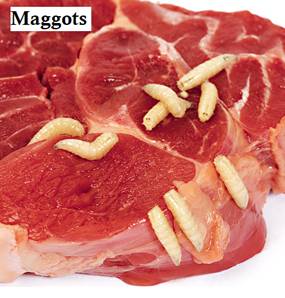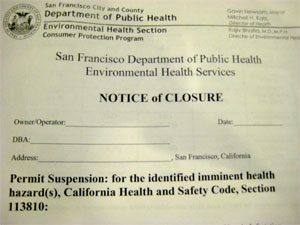McCormick & Schmick’s Seafood and Steaks, a favorite lunch destination of Center City bankers and Philadelphia city officials, was issued an order to cease and desist operations this week after an inspector discovered “wastewater backing up into the establishment” and “nonpotable water” leaking from the kitchen ceiling.
 Though the restaurant managers agreed to immediately shut down on Wednesday until repairs were complete, business went on as usual.
Though the restaurant managers agreed to immediately shut down on Wednesday until repairs were complete, business went on as usual.
“We never closed,” said a floor manager who answered the phone on Thursday. She declined to provide her name.
Asked why the restaurant had continued to operate without interruption, a corporate official for the restaurant chain issued a statement.
“We acted swiftly to resolve the situation, and as a result were able to remain open,” said Howard Cole, senior vice president and chief operating officer of McCormick & Schmick’s. “The location has passed all compliance inspections. It is important to us at McCormick & Schmick’s that food safety measures are instituted and followed.”
In his report, health sanitarian Terrance Carter said there was “a foul odor in the establishment” during the Wednesday inspection.
When Carter asked about the wastewater standing in the sinks and on the floor, the person in charge explained that a plumber had been called “several days” before, but no one had shown up. Carter advised the restaurant to call again immediately, according to the report.
Jim Chan, the recently retired manager of Toronto’s DineSafe program, reviewed the inspection document at the request of the Inquirer.
“Wow, what a bad report!” said Chan. “It shows that they did not check and correct food safety and sanitation issues until the inspection. They sat and waited until being told to get things done.”
 Chan said he was disturbed at the mention of the foul odor.
Chan said he was disturbed at the mention of the foul odor.
“When you say that, you’re saying there’s a possibility of sewage,” he said. “If it’s just water backing up, you don’t smell a foul odor.”
In most North American cities, an order to cease and desist requires management to shut down the business promptly and tell all patrons to leave, Chan said.
A spokesman for the Philadelphia health department was unable to explain why McCormick & Schmick’s had remained open.
For years in Philadelphia, restaurants have been able to ignore cease and desist orders. In mid-February, the city announced it had given health inspectors the power to shut down an eatery without calling in the department of Licenses & Inspections.
Those powers will go into effect sometime this month.
 On March 22, 2016, the same company recalled all packages of soybean sprouts because they may be contaminated with Listeria monocytogenes.
On March 22, 2016, the same company recalled all packages of soybean sprouts because they may be contaminated with Listeria monocytogenes.



 shops and other food businesses were served with closure orders last year — the highest tally since it was established in 1999.
shops and other food businesses were served with closure orders last year — the highest tally since it was established in 1999. inspections and help diners more easily find a restaurant’s health score.
inspections and help diners more easily find a restaurant’s health score.